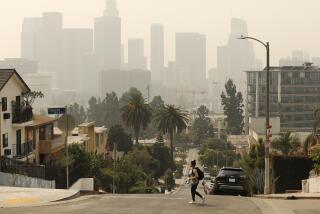Air pollution causes lung cancer, World Health Organization says
It’s official: Breathing dirty air causes lung cancer.
The World Health Organization on Thursday declared air pollution a human carcinogen like tobacco smoke, asbestos and arsenic, calling it a leading cause of cancer deaths globally.
Health experts have known for years that air pollution increases the risk of a wide range of ailments, including respiratory problems and heart disease. Some compounds in the air we breathe, such as diesel exhaust, have already been deemed cancer-causing.
But this is the first time the organization’s International Agency for Research on Cancer has classified air pollution in its entirety as a cause of cancer.
The complex mixture of gases, fine particles and other pollutants in the air were labeled “carcinogenic to humans,” the highest of the agency’s four-level classification system.
A panel of experts convened by the WHO’s cancer research arm made the finding after reviewing thousands of scientific papers.
“We now know that outdoor air pollution is not only a major risk to health in general, but also a leading environmental cause of cancer deaths,” Kurt Straif of the international cancer research agency said in a news release.
Air pollution also increases the risk of bladder cancer, the agency reported. Experts also evaluated particulate matter, one the largest components of air pollution, and classified it as a carcinogen.
While air pollution levels vary widely across the globe and have fallen in the United States, exposure is on the rise in rapidly industrializing countries, the agency’s report notes.
Air pollution caused more than 220,000 lung cancer deaths worldwide in 2010, the agency reported; more than half of lung cancer deaths from particulate matter were in China and East Asian countries.
The agency’s report did not quantify the cancer risk to individuals or countries.
That can be hard to pin down because the sources of air pollution are widespread and ubiquitous, including vehicles with internal combustion engines, power plants, factories and farms, according to the report. The agency wanted to review air pollution globally to understand the role it plays in the more than 1.3 million new cases of lung cancer recorded each year.
“Even a small contribution from air pollution to this number would strengthen the justification for implementing tighter control measures,” the report says.
Twitter: @tonybarboza







